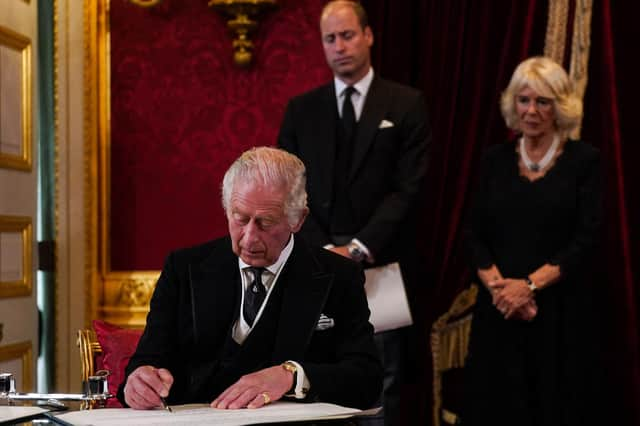King Charles: A solemn ceremony, witnessed by the world for first time


William put out a guiding hand behind his stepmother Camilla, who now bears the style Her Majesty, as she gingerly navigated the step up onto the platform, moving into the spotlight in the opulent room packed with some 200 Privy Counsellors.
The prince – now heir to the throne – cast his eyes down as Lord President of the Privy Council Penny Mordaunt opened the proceedings, discharging her “sad duty” to inform those gathered of the passing of Her “Most Gracious Majesty Queen Elizabeth II”.
Advertisement
Hide AdAdvertisement
Hide AdCamilla, dressed in black and wearing a three-strand pearl necklace, stared straight ahead, surveying the scene, as six former prime ministers, the entire Cabinet, and religious and political leaders past and present listened intently to the ceremony.
There was utter quiet as the words echoed around the grand room, with its deep scarlet flocked walls and imposing oversized portraits of previous monarchs including King William III.
Yet the grandeur and importance of the first part of the Accession Council was in stark contrast to the scene just moments before when the room had buzzed with noise and the loud chatter of conversations.
Before the arrival of the royals and the platform party, the politicians and other Counsellors, who were stood shoulder to shoulder packed in a busy crowd, greeted known allies and past political rivals, in what could have been a celebratory event, save for the black mourning clothes.
There was a slight temporary hush in the room as Sir Tony Blair entered leading a pack of five more former PMs – Gordon Brown, Boris Johnson, David Cameron, Theresa May and Sir John Major – before the chatter quickly rose up once again.
The ex-prime ministers took their places in the front behind a low black roped barrier, which was a respectful distance away from the dais. As the former PMs gently asserted precedence over the rest of the Counsellors by moving into the primary spot as per the arrangement, those already in the front including the Speaker Sir Lindsay Hoyle shifted back to make way.
Mr Cameron looked cheery as he entered the room, saying: “Morning, how are you?” to Commonwealth High Commissioners watching from the left of the dais.
Newly departed prime minister Mr Johnson proceeded with his head slightly down and appearing a tad sheepish, before later striking up an animated conversation with Mr Brown. Mrs May and Sir John Major were deep in conversation.
Advertisement
Hide AdAdvertisement
Hide AdAlso present was the former Archbishop of Canterbury Lord Carey, whose leadership of the Church of England spanned the difficult times of the then-Prince of Wales’s divorce from Diana, Princess of Wales, and the fallout from Charles’s affair with Camilla.
So much has changed, as he witnessed the former Mrs Parker Bowles become Queen, and Charles being proclaimed King Charles III.
William was the first to sign the Proclamation, carefully stepping forward to pick up the pen with his left hand before placing his signature on the historic record, as he replaced the lid and set down the pen.
He was followed by Camilla, who slowly signed her named with care. Her eyes darted briefly towards William as she returned to his side on the dais.
The prince moved back and forward just a touch as he stood there with his hands clasped, with the grieving pair both solemn but in control of their emotions.
As the order of business for the proclamation was set out, William gazed upwards at the ceiling surveying the grand surroundings – in the palace he knew well as a child.
With the short proceedings at a close, William acknowledged Prime Minister Liz Truss as the party made their way through to the Council Chamber for the second part of the Accession Council.
Moments before Part I of the Accession Council began, Cabinet Secretary Simon Case briefly took to the dais, declaring: “The meeting will begin shortly. Please make sure mobile phones are switched off.”
Advertisement
Hide AdAdvertisement
Hide AdIt was just one reminder of how times had changed since the late Queen acceded to the throne more than 70 years ago.
Another reminder came in the form of the two television cameras broadcasting the proceedings from either side of the Gallery, as the ceremony was televised for the first time.